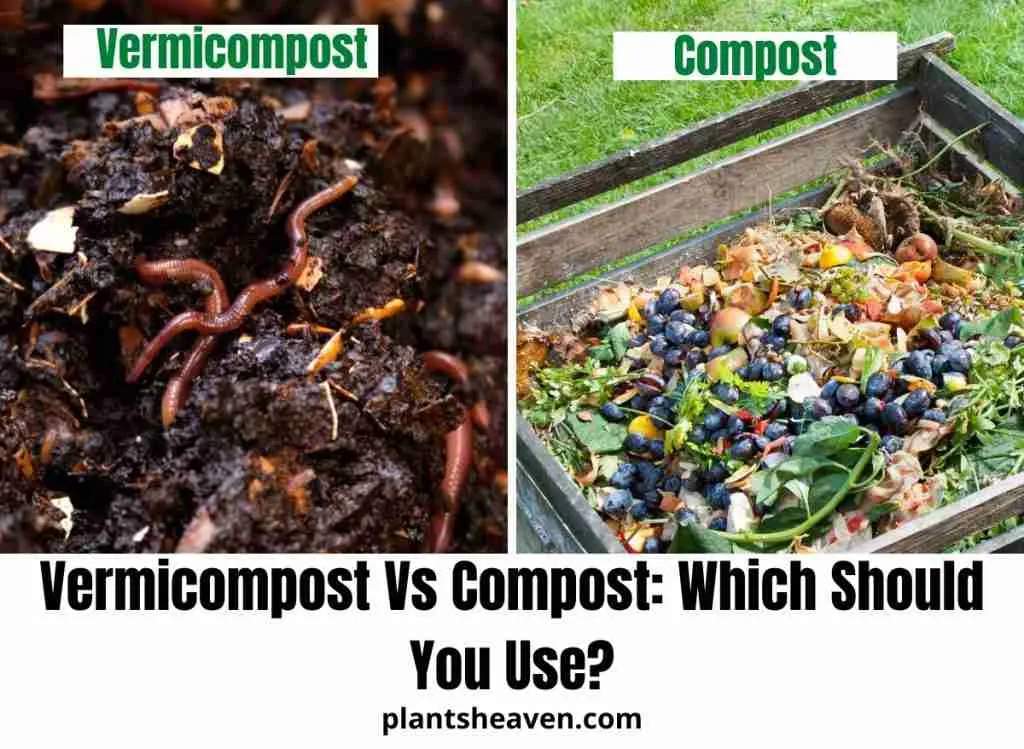Nutrients are one of the essential elements that contribute to the healthy growth of flowers, vegetables, fruits, and other gardening plants. A soil rich with all necessary nutrients will show better growth of plants as compared to the old soil that lacks important nutrients.
Over time, your garden soil may run short of nutrients. But in the modern age, it is quite easy to add nutrients to such soils. You can use any of the composting or vermicomposting methods to add the necessary nutrients to the soil. So, vermicompost vs. compost: which one should you choose?
Traditional composting and vermicomposting are popular techniques for breaking down plant waste and turning them into organic fertilizer. Both approaches have their advantages. While traditional composting requires frequent turning, vermicomposting, also known as composting worms, are like pets that need constant care. Vermicomposting is faster but cannot handle an unlimited volume of organic waste.
So, vermicompost vs. compost: which should you use?
See also: Best Ways Of Using Nematodes To Control Garden Pests!

Vermicompost Vs Compost
Vermicompost and compost have some unique features separately. Here is a brief comparison of both these nutrient addition methods.
| Compost | Vermicompost | |
| Definition | Vermicomposting, also known as composting with worms, uses worms to produce rich compost from kitchen or household wastes. | Vermicomposting, also known as composting with worms, uses worms to produce rich compost from the kitchen or household wastes. |
| Space Requirement | Since traditional compost piles are deep, you generally don’t need ample space. | Generally, vermicomposting does not process huge amounts of waste at a time. |
| Microbial Populations | Since traditional compost can be hot, it is favorable to thermophilic (heat-loving”) microbes thriving in hot temperatures. | Mesophilic microbes dominate vermicomposting, thriving in more moderate temperatures. |
| Time requirements | It is a time-consuming process as it will need frequent turnings. | It is a quicker process and needs less time. |
| Nutrients content | It has a less fine nutrient structure. In a shorter time, traditional compost does not provide the required amount of micro and macronutrients, including the vital NKP, to plants (compared to vermicompost). | Vermicompost is rich in NKP: – Nitrogen 2-3% – Potassium 1.85-2.25% – Phosphorus 1.55-2.25% |
| Pathogens | The compost nutrient addition method adds ammonium adequately to the soil. | This nutrient addition method adds nitrates adequately to the soil. |
| Where To Set it up | It is best for the outdoors. | It is suitable for both indoor and outdoor activities. |
| Speed of Processing | Composting is generally slow as a hot compost pile can take about 6 to 9 months to complete. | Vermicomposting is faster compared to traditional composting. A vermicompost bin takes about 8 to 12 weeks to complete. |
| Aeration requirements | Generally, composting requires that you turn input materials to ensure complete processing and help oxygenate the insides of a compost pile. | You don’t need to turn the inputs with vermicomposting because the worms will do the turning for you. In addition, since vermicomposting bins are relatively shallow, no turning is needed, particularly in continuous flow-through digesters. |
| Cost | Traditional composting is generally cheap. Just locate a spot in your property and begin making layers of browns and greens. | Vermicomposting isn’t expensive, but you have to invest in the worms and a bin. And ensure you protect your worms from extreme elements, meaning you need to reserve a space and possibly invest in heating or cooling your vermicomposting spot. |
| Convenience | You can do traditional composting outdoors if you live in a rural or secluded area. | You can vermicompost both outdoors and indoors. If you live in an apartment, you can compost with worms. Gardeners prefer composting indoors than outdoors. |
Which is Better, Vermicompost Or Compost?
Vermicompost has many benefits over traditional composting methods. Here are some of the reasons that put the vermicomposting method on top.
- It features an adequate amount of nutrients like nitrates, phosphorus, and potassium.
- Needs little effort.
- You can carry out both indoors as well as outdoors.
- Faster method.
- You can carry out this method in tight spaces.
- It makes the water-holding capability of the soil better.
All these benefits of the vermicomposting method put it above the compost method.
See also: Can You Really Compost Bread? (Let’s find out!)
What Is The Difference Between Compost And Vermicompost?
Here are some of the major differences between vermicompost and compost.
| Compost | Vermicompost |
| Uses high heat that helps to kill hazardous most pathogens that come with organic matter. | Vermicomposting uses cool temperatures and will not kill pathogens. Follow proper vermicomposting guidelines, and a few harmful microbes will grow. |
| Thermophilic microbes dominate traditional composting since they can survive in high temperatures. | Mesophilic microbes dominate this method because they can’t survive high temperatures. |
| It is a slow nutrient addition method. | It’s comparatively fast. |
| It’s a cheap process. Generally, traditional composting does not require any money. You can choose any outdoor space in your property at a reasonable distance away from your home. | It is an expensive process. Vermicomposting requires you to invest worms and a container that you can use in the long run. The worm population will reproduce and grow to the bin’s capacity with proper maintenance. |
| Frequent aeration is necessary for this method. So, the proper turning of material is necessary. | This method doesn’t need aeration as it’s effective without turning. |
What Are The Disadvantages Of Vermicomposting?
Though more effective, the vermicomposting method of nutrient addition has some disadvantages too. Here are some of its drawbacks.
- You will need to take care of worms, particularly at the beginning.
- It is a relatively expensive method compared to traditional composting.
- It is not effective in killing pathogens.
- You will not be to handle large volumes of organic waste.
Is a Worm Farm or Compost Better?
Vermicomposting is a variation of worm farming, a technique known as vermiculture. Worm farms are far better than compost because vermicompost is one of the richest compost forms for your plants.
Compost uses microbes, while worm farms use worms to break the organic matter. The worms in worm farming eat rotten scrapes but excrete casting that adds to the fertility of the soil. This is very beneficial for gardens and other crops.
See also: How Can You Effectively Turn Granular Fertilizer Into Liquid?
Similarities Between Vermicomposting and Composting
Despite the major differences between vermicompost and compost, there are many similar features of both these nutrient addition methods. Some of their similarities are listed here.
1- Use the Same Process
Vermicompost and compost use different microbes for their processing, yet they use the same process for the breakdown of organic material. They use microbes to consume rotten organic matter.
These decomposers consume the organic material and excrete the beneficial organic compounds that add to the fertility of the soil. So, the basic method of both these processes is the same.
2- Work in The Presence of Air
Another common thing between compost and vermicompost is that they operate in the presence of proper air.
Without proper aeration, they fail to carry out the nutrient addition processes. So, this is another same feature of both vermicompost and compost.
See also: How Can You Properly Compost Rice? (Here’s how!)
3- Both Break Down the Nutrients
Another similarity between compost and vermicompost is that both these methods break down the organic material into their constituents.
These resulting constituents help to increase the fertility of the soil.
4- Both Add to the Fertility of the Soil
The basic purpose of both these methods is the same. The composting method uses traditional organic material to enhance the fertility of the soil.
While vermicompost uses essential worms to enhance the fertility of the soil. The basic purpose, enhancing fertility, of both these methods is the same.
5 – Both vermicompost and compost break down organic waste into fertilizer
Both vermicompost and compost break down organic waste into fertilizer, including pasta, rice, and bread.
Vermicomposting uses kitchen waste, while composting uses kitchen scraps, yard waste, and other organic debris.
See also: Top 10 Best Helpful Insects For Your Garden
Differences Between Vermicompost and Compost
There is a long list of differences. Between compost and vermicompost methods. Some major differences are listed below.
- Composting is typically hot because the aerobic breakdown of organic matter releases heat and carbon dioxide, resulting in piles that can top 150°F, which can kill the pathogens present in your compost.
- Vermicomposting (AKA Composting with worms ) is a cooler process with temperatures varying between 50-90°F. But the disadvantage of lower temperature is that vermicomposting will not kill as many pathogens in the kitchen waste you feed the worms.
- Both these nutrient addition methods differ in their respective heat quantity.
- Generally, vermicomposting occurs in a bin and combines organic material and worms. The worms eat the organic material, producing worm castings (worm poop).
- Vermicomposting is suitable for small amounts of organic matter and might not be very practical for large quantities of yard waste.
- They use different microbes for nutrient addition.
- Helpful in cleaning kitchen scraps, but worm composting does not appear suitable for the yard waste produced by gardeners.
- Traditional composting may attract unwanted visitors, including wild worms.
See also: Can You Successfully Compost Pasta? Here’s The Truth!
Vermicompost Vs. Compost: Which Should You Use?
The best composting method is what you can sustain long-term because you enjoy doing it, and it fits your lifestyle. Both vermicompost and compost are better than throwing yard waste to the curb.
- If you don’t have a garden, try vermicomposting because it requires less effort and mainly uses kitchen waste. Vermicomposting is best suited for the quicker processing of smaller quantities of waste.
- It would be better to try cold composting your yard waste and leaves if you have a garden since it is very flexible and requires less work.
Vermicomposting is a physical process under low to moderate temperatures that depend on the worms’ burrowing and eating capacity and tolerance to environmental conditions.
On the other hand, composting happens under high temperatures and does not depend on any limitations on depth. Even though hot composting is slower, it is better suitable for processing large amounts of waste.
See also: 10 Must-Know Miracle-Gro Alternatives!
Final Thoughts
Essential nutrients are compulsory for the perfect growth of garden plants, vegetables, or any other type of plant.
Over time, the soil may lose its fertility. To improve your soil deficiency, you can try vermicomposting if you have limited space and composting if you have a larger amount of waste.


